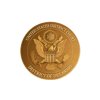Sussex official says collecting water tax an expensive problem
Gov. Jack Markell knows a proposed clean water tax is a tough sell. Collecting the tax via county property tax bills won't be easy either, at least in Sussex County.
For starters, Sussex County Administrator Todd Lawson said the county's computer system cannot provide data requested by the Delaware Department of Natural Resources and Environmental Control to determine how the tax would be collected.
An upgrade to the system would cost tens of thousands of dollars, he said during a recent county council meeting. The county sends out more than 160,000 property tax bills each fall and already collects school taxes for every district in Sussex County, passing those funds on to the state.
“The county's role would be delivery of the bill. Can the county work this into its computer system?” he asked. “That's a question that is still unanswered. No one has seen the details.”
Lawson said too many variables exist that could cause problems for county staff. “This could end up costing the county hundreds of thousands of dollars and lots of staff time,” he said.
During its April 16 meeting, members of the Water Infrastructure Advisory Council – the group charged with submitting recommendations to the Markell administration – acknowledged the public and legislators need to hear more about the benefits the tax would support.
The governor and DNREC officials have proposed the tax to help fund a $900 million initiative to clean up the state's bays, rivers and streams through the Clean Water for Delaware's Future Fund. The tax would range from $45 to $85 for property owners and up to a maximum of $25,000 for larger water users such as multi-family, commercial and industrial complexes.
DNREC officials say 94 percent of rivers and 74 percent of lakes and ponds in the state are polluted and do not support healthy fish and aquatic life; 86 percent of rivers and 41 percent of lakes and ponds are not safe for swimming.
Revenue from the tax could be leveraged with money from the existing Clean Water and Drinking Water Revolving Fund to allow the state to borrow additional funds at low interest rates. The funds could be used for wastewater and drinking water system upgrades; industrial plant upgrades; agriculture programs; conservation programs; and stream restoration.
Lawson said the county's property tax assessment system is complicated, in part because all properties are taxed on 1974 values, the last time the county assessed property. “We use a unique formula to create a bill; the question is how we figure this proposed tax into that formula as a new line item,” Lawson said.
He's not sure if the proposed water tax would be based on assessed value of a property or its improvements. He also said there is no way to determine water usage for most properties if that was to be a mechanism to determine the tax.
Lawson said the proposed tax could hurt farmers who have irrigation systems that use large amounts of water each summer. “Is there an ag-use exemption?” he asked. “The details are still to come.”
Lawson said because the tax line item would be included on the county property tax bill, the county would have to answer calls from the public about it.
“If this ends up being mandated by the state, we would need lots of time to get it implemented,” Lawson said.
Former Sussex County Administrator David Baker is the county's representative on the Water Infrastructure Advisory Council.




















































